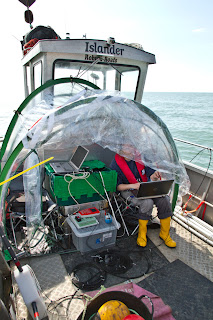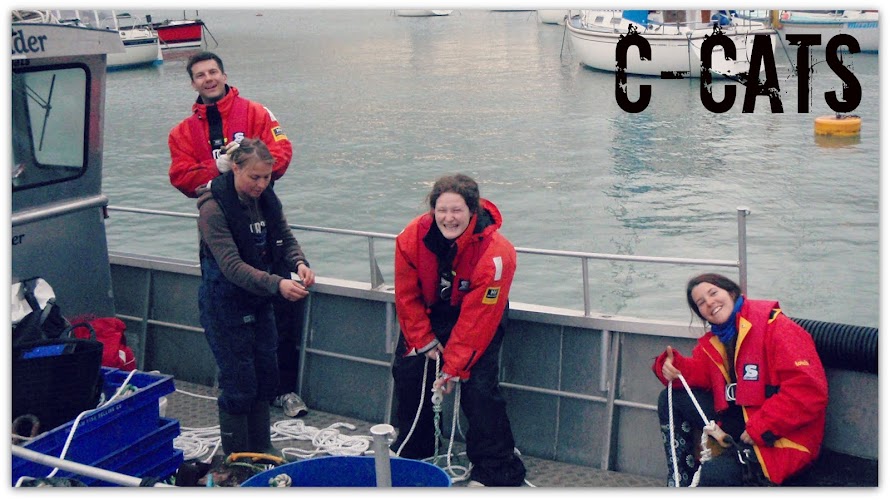The ring of alarm of alarm bells marked the begin of
Thursday morning at the C-CATS base in New Quay. Roused at 4:30 AM,
there was just enough time for a direly needed cup of coffee before
the team split up to take advantage of calm seas. While Gemma, Winnie
and Katrin scaled the coastal path up to the cliff with only head
torches illuminating their path, Hanna, Luke, Katie and Marta made
their way down to the harbour to prepare the boat for a morning of
playback experiments.
 |
| An early start for the C-CATS team: New Quay before dawn |
On the cliff, the practice
sessions with the theodolite paid off and the equipment on the cliff
was set up just as the sun rose and the Islander arrived at the grid
of PODs. It was not long before the cliff observation team could put
their experience to the test; a group of six bottlenose dolphins,
including two calves, appeared at 7 AM and delighted the cliff team
(or C-team) with their high energy displays; breaching, tail slapping
and lunging for fish at the surface. They stayed in the area for over
2 hours and were successfully tracked with the theodolite throughout
that time. Not having anticipated such a long encounter, however,
meant that there was now a shortage of forms and Gemma had to call
for reinforcement from the home base. Jens gallantly volunteered to
trek up the cliff with the forms himself but unfortunately missed the
last dolphins of the day, a pair of adults travelling swiftly through
the grid, by about five minutes.
 |
| Panoramic view of the cliff observation site |
 |
| Directional transducer for playback |
Excitement was also at an
all time high on the Islander. After days and days of preparations,
the calm seas finally allowed for systematic playback experiments.
During these experiments, the team aimed to play artificial and real
porpoise sounds to a specific set of PODs to determine factors that
may affect the likelihood of PODs detecting the animal. For this
purpose, in addition to the existing deployed PODs a special 'triPOD'
was designed; a set of three C-PODs set in a triangular wooden frame,
lovingly named 'Jemima'. The team deployed Jemima within the existing
grid of C-PODs and then proceeded to play back artificial porpoise
sounds at varying distances and volumes. They used two different type
of playbacks, omnidirectional, broadcasting sound 360 degrees from
the source, and then directional, using a specific setup to direct
the sound towards the C-POD in a way that more closely resembles the
narrow echolocation beam of a porpoise. Although the weather was an
improvement on previous days, the winds did pick up significantly
throughout the day and by early afternoon, the crew had to battle
choppy waters while trying to stay put during playbacks.
Nevertheless, they were not deterred, determined to make the most of
brief window of opportunity and successfully conducted both
directional and omnidirectional playbacks at 3 separate stations -
all without any seasickness casualties!
 |
| Playback from the 'Culticave' |
In the early afternoon
however, the boat team was forced to return to New Quay harbour to
pick up a spare battery to power the laptop from which the playbacks
were conducted. Having exchanged the battery and a couple of crew
members, everyone was ready to get back to work. Apart from the
Islander. As Luke tried to start the engines it became apparent
something was very wrong. One of them was not starting at all. After
a preliminary look to see if any superficial problems could be
spotted, Hanna called New Quay's lifeboat mechanic who came down to
have a look. While the problem itself turned out not to be serious,
the next supplier stocking the required part was located a 4 hour
roundtrip from New Quay. Frustrated after being stopped short in our
tracks after such a successful day, we decided to call it a day.
There was only one problem. Jemima was still out there and with the
winds picking up, leaving her to her fate could have meant losing her
-and all the data- permanently. While everyone else headed home to
get some dinner, Luke and Hanna stayed with the Islander, discussing
our options. Finally, the decision was made that we would attempt to
retrieve Jemima. On empty stomachs and over 12 hours at sea, Luke and
Hanna manoeuvred the Islander through stormy New Quay waters on just
one engine and Marta's support. Despite the fading daylight and
crashing waves, Jemima was successfully retrieved and her safe
return- and of course Hanna's, Luke's and Marta's as well- came as a
great relief to everyone.



No comments:
Post a Comment